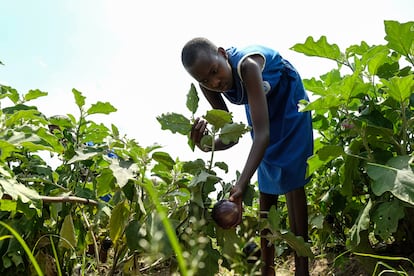Africa doesn't need more climate pledges. It needs capital.

Strictly opinion pieces that reflect the author's unique style. These opinion pieces must be based on verified data and be respectful of individuals, even if their actions are criticized. All opinion pieces by individuals outside the EL PAÍS editorial team will include, after the last line, a byline—no matter how well-known the author may be—indicating their position, title, political affiliation (if applicable), or main occupation, or any that is or was related to the topic addressed.

The first African Climate Summit , held in Nairobi in 2023, represented a turning point. It lit the fuse for a collaborative, climate-resilient, and prosperous Africa. This week, African leaders gathered in Addis Ababa for the second summit and delivered an unequivocal message: enough is enough with the promises. What is needed is money, investment, and concrete actions to unleash Africa's green potential.
The historic meeting in Kenya made the stakes crystal clear: climate change is a threat to communities, economies, and investments across all sectors and continents. But it also shifted the global narrative, transforming Africa from a climate victim to a driver of solutions . The summit produced macroeconomic pledges and commitments to facilitate climate-positive growth, while also highlighting the continent's environmental strengths and its undeniable importance in achieving global net-zero emissions goals.
This year's summit, held at a critical juncture in the run-up to the 30th UN Climate Change Conference (COP30), established guidelines for aligning African priorities in climate and sustainable investment. African leaders agreed to move forward with common criteria for international cooperation, in a context marked by the upcoming African Union-European Union Summit in Luanda in November.
Since Nairobi, the world has undergone profound geopolitical and economic changes that have led to fragmentation and, at times, the mistaken belief that minimizing international cooperation is best for a country's strategic interests. This tendency must be combated. Common problems require common leadership. The AU-EU partnership, now celebrating its 25th anniversary, must be a stabilizing force and contribute to multiplying progress on climate and development.
We know what steps are needed to fulfill the promises of the first African Climate Summit. As Ambassador André Corrêa do Lago—designated to preside over COP30 in Brazil —stressed at the Financing for Development Conference held in Seville last July, it is time to move from negotiation to implementation.
Africa, a driving force for global climate solutions, has immense strategic assets: 60% of the world's best solar resources, 60% of the remaining arable land, 40% of critical mineral reserves, a blue economy that currently generates $300 billion annually and has the potential to exceed $1 trillion annually, a social fabric sustained by strong women and their associations, and a young population that is projected to constitute 40% of the world's youth by 2030. These are not theoretical advantages, but the foundations of a global green economy. That is why what Africa is asking for is crystal clear: we will work together to unlock the right type and volume of capital and ensure market access, so that climate action can be taken where it makes the most sense.
Access to affordable financing is restricted by outdated eligibility criteria, high capital costs, and debts that penalize the most vulnerable countries.
For too long, ineffective global processes have prevented Africa from realizing its full green potential . Access to affordable financing is restricted by outdated eligibility criteria, high capital costs, and debt that penalizes the most climate-vulnerable countries. This situation must change, ensuring the necessary reforms to harness Africa's natural strengths and accelerating a fair and climate-positive growth model.
There are three fundamental priorities:
First, strengthen Africa's capacity to act. This means ensuring the continent can determine the rules that affect its future, through participation in decisions on trade standards and green industrial policies. It also means mobilizing more domestic capital and designing country-led investment plans that reflect local priorities. Community leadership is critical to developing and scaling up climate solutions, leveraging traditional knowledge, and empowering networks of women and youth to champion these ideas. Too many projects today are stalled by lack of capacity, high debt costs, currency risks, and regulatory bottlenecks. Overcoming these barriers is critical to ensuring that money is available and that it translates into results.
Second, build coalitions that deliver on commitments. Africa's growth depends on partnerships that go beyond mere lip service. Strengthening industrial links between African and European economies will be critical. To succeed, governments, development banks, and financial institutions must go beyond just talk and design tools such as guarantees and blended finance that can unlock real investment. Systemic changes will also be essential: phasing out fossil fuel subsidies, addressing non-tariff barriers, and ensuring that major polluters contribute their fair share through solidarity levies.
The International Monetary Fund's quotas and the World Bank's voting power must change to give African countries a real voice.
Third, reform global finance. Africa cannot make its green transition while trapped in an outdated system that penalizes the most vulnerable countries. Requirements for favorable financing conditions must also reflect climate vulnerability, not just income level. International Monetary Fund quotas and the World Bank's voting power must change to give African countries a real voice. And debt treatment must be improved: suspending payments during major crises and including climate resilience as a factor when assessing debt sustainability. Without these reforms, Africa will continue to lack access to the capital it needs.
What these priorities have in common is one truth: Africa's ecological potential offers the world the best chance of achieving net-zero emissions. Therefore, collaboration is not only preferable, but essential.
EL PAÍS




